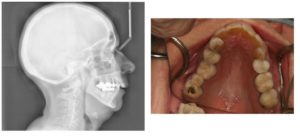
Your orofacial structural, including the teeth, jaw, airway, and more, form a complex network. Each part of that network should contribute to proper breathing, speaking, and chewing. However, if any of your orofacial structures develop improperly or become malformed for other reasons, you could face serious oral and overall health problems. A dentist in Fox Chapel is here to discuss the dangers of airway and palatal constriction and the treatment that may be able to help you.
Palatal and Airway Constriction — The Basics
Your upper and lower teeth should form smooth arches that allow your jaw to close comfortably. Proper alignment of the teeth promotes a functional bite and can prevent problems with the jaw joint. However, if one of the jaw arches is too narrow, that palatal constriction can lead to a number of problems, including:
- An uncomfortable bite
- Teeth that do not fit well together, resulting in an increased risk of breakage
- Cosmetic problems related to a an overly narrow jaw
Airway constriction is also a significant problem for many people. It may be temporary. For example, allergies can cause inflammation in the airway that causes it to become narrow. In other cases, defects in the jaw (such as an overly narrow upper jaw) or the surrounding structural cause the soft tissues in the mouth, such as the tongue, to block the airway on a regular basis, particularly at night. The constriction can lead to obstructive sleep apnea, a dangerous disorder that causes periods throughout the night when a person is not breathing.
Freedom from Palatal and Airway Constriction
If you think you may be suffering from airway and/or palatal constriction, your first step should be to schedule an appointment with your restorative dentist. Dentists are experts on the orofacial structures and how they should function together. After performing a visual examination, talking to you about your problems, and perhaps taking some X-rays, the dentist can determine the nature of the issues that are affecting you. Then, they can design a treatment plan.
Orthodontic treatment may help. After your teeth get repositioned, your tongue will have more room. Thus, it can rest in its proper position and will be less likely to block the airway at night. Proper tooth alignment will also reduce your risk of suffering from oral health issues like broken teeth and premature wear and tear on your pearly whites.
You shouldn’t have to suffer with the consequences of palatal or airway constriction. Visit an expert who can get you on the path to a healthier mouth and easier breathing.
About the Author
Dr. Ray Voller has decades of experience in dentistry. Throughout the years, he has channeled much of his focus into learning the ins and outs of restorative treatments, orthodontics, TMJ treatment, and full-mouth reconstruction. If you would like his help to achieve a healthier mouth and higher quality of life, contact our Fox Chapel office today at 412-406-8100, or get in touch with our Kittanning office at 724-543-4948.
